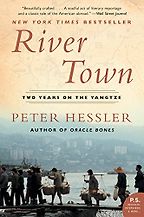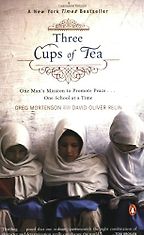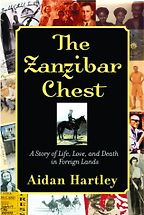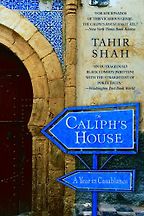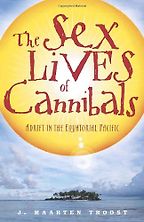How would you describe the books you’ve chosen?
They’re memoirs. They’re five of the books I read when I was writing my own memoir of the time I’d spent in Yemen editing the Yemen Observer. I wanted to read a lot of other memoirs by Westerners who were travelling to Eastern places: how they structured their books, how personal they made their experience, how funny or serious… So with the exception of Three Cups of Tea, which is closer to a biography, they’re all written in the first person.
Which would you like to talk about first?
Let’s start with River Town by Peter Hessler. River Town is his memoir of two years teaching for the Peace Corps at a teacher training college in China in a very remote city – a small city of 200,000 people or so, very few of whom had ever met foreigners. So Hessler really was in a very isolated, alien place. I love this book for many reasons. Firstly because he’s a beautiful writer and he gives you this wonderful sense of what it’s like to actually be there: the landscape and the people and the hustle and bustle, the pollution and the way the city’s built in the mountains with stairs going up and down, and the porters to carry your stuff that they call ‘stick-stick men’. He makes it really easy for you to visualise this foreign place.
The chief influence for you was the visual aspect?
I liked that part of it, yes. But for me the most relevant thing to what I was doing was that he was teaching – in his case Shakespeare and other English and American literature to Chinese students – and a lot of his students wrote in ways that were similar to the way my Yemeni reporters wrote.
Not very well?
Their English wasn’t fantastic, but I mean in terms of the way the misunderstandings he’d have with his students reminded me of the misunderstandings I’d have with my reporters: differences of culture. So, for example, he was teaching with another man, Adam, who would ask his students to write about anything they wanted – ‘Write about anything you want!’ – and what he got from them were shopping lists. Everyone wrote: ‘What I want is a new TV, I want a new computer, a car…’ He talks a lot about how his relationship with his students changed as he learned Chinese, and how, as he learned the language, his own personality changed as well as his relationships with Chinese people.
He’s also very frank in criticising what he sees as political group-think in China. They’re very homogenous in many ways, and easily brainwashed with ideas about what the outside world is like, so he’d get a lot of essays about the sexual habits of Western women, about how they are bad women compared to Chinese women who are elegant and poised and refined.
What’s your next book?
Three Cups of Tea – I felt incredibly daunted when I read this book. When you’re writing a memoir, you’re put in the awkward position of being in the story and not wanting to come off as narcissistic and yet you must think your story’s interesting or you wouldn’t be writing a book about it. But the thing is that while my reporters changed my life and I hope I changed theirs, there were about 16 of them, and Greg Mortenson has changed literally thousands and thousands of lives.
So what did he do?
Well, he had a failed attempt to climb K2 back in the early 90s and when he was wandering down the mountain he got lost and wound up in this little place called Korphe, a village, and the people took him in and helped him get his strength back. And while he was there he watched the children at school, except they didn’t have a schoolhouse so they knelt on the ground outside, often in the snow, and drew in that or the mud. So these villagers said they wanted a school and he promised he would come back and give them one.
So he goes to the US and launches a fund-raising crusade, and he gets his money, but now he needs to get together the materials, transport them to this very remote location in Pakistan and get the thing put together. There’s bargaining, there’s this very tricky region, there’s stuff that’s stolen along the way, and it takes ages to build the school, but it does get built, and after that he builds dozens of other schools, especially schools for girls, who haven’t had much of a chance for education in Pakistan.
It’s the most incredible story. He gets kidnapped in Waziristan, in the northwest, where he had no real contacts, and that taught him that schools only get built where you’ve got contacts, because otherwise you’re in big trouble. There’s a fatwa against him at one point, but he gets a letter from one of the highest imams in the country saying the fatwa’s nonsense. He keeps persevering. He learns Urdu, he becomes obsessed – he comes across as a Christ-like figure really, though he’s always late for things…
A very appealing quality…
The writer, David Oliver Relin, admits that he’s not an objective observer, he’s very in favour, and it is a mission. It feels like a religious devotion and it made me feel that my story was very, very small in comparison. But that really is the sort of thing that Yemen needs. I mean we’re just as in danger of uneducated people falling into the hands of terrorists, people with no jobs and no schooling. This book explains why this is a better way to fight terrorism than the military. This is how you fight it: by widening people’s horizons, not with planes and bombs.
Third book?
The Zanzibar Chest – these first three books are all about people doing good in the world. This time the author, Aidan Hartley, worked for Reuters as a freelancer for many years. He has an interesting family history: his father lived in Yemen and I was lent Aidan’s book by a Yemeni general, who recommended it to me.
It’s two stories in a way: Aidan’s reporting in Africa, including Rwanda – serious crisis reporting – and then the story of this friend of his father’s, Peter Davey, a British diplomat who practically went native in Yemen and who died in mysterious circumstances. They’re almost two different stories and they possibly don’t even belong in the same book, but I love the book. There’s so much material from Aidan’s journalism, a lot of it horrific, a lot of it very personal. Aidan Hartley took a lot of drugs and slept with a lot of women, and if you’re a woman memoirist you’re going to find it harder to get away with that kind of material.
But what I like about Aidan’s life is that he took major risks. He was right in the centre of the action and it really gives you a sense of what went on there, which you don’t necessarily get when you just read the papers. He talks about the effect of doing this war reporting on a relationship he’s having, and how, actually, his relationship is supported by the adrenaline of what he’s doing and tends to falter when he’s on holiday.
What’s next?
Let’s talk about The Caliph’s House. So these last three books were about important things: people trying to get the rest of the world to understand an important subject. These last two are lighter, and The Caliph’s House is wonderful because its author, Tahir Shah, is just this guy you want to be friends with, to hang out with and follow around. The book’s about this house he bought in Morocco. He’d decided to move with his family from England, on a whim almost, in an effort to lead a more interesting life, and they buy this massive palace of a house. But it’s in ruins and the story’s just his efforts to get it renovated, painted and livable: a massive undertaking. And while doing this he gets to find out how businesses are run in Morocco, and the very different ways in which work gets done.
A bit like the school building challenges in Three Cups of Tea?
Yeah, but in this case how to get a palace built. Basically he gets a Moroccan fixer who helps him find workers and explains cultural misunderstandings, some of them quite strange. So for example there are several caretakers that come with the house, and these caretakers believe in the jinns. The jinns are spirits and they can haunt places, take over peoples’ bodies, cause no end of trouble. A lot of the book is about these jinns – good jinns, bad jinns, but mostly the bad ones – and it ends…well, you should find out how it ends. Superstition and how you navigate around it is central to the building project. It’s a funny, entertaining book, and Tahir’s sense of humour in the face of adversity is one of the most attractive things about it.
We’re talking here about cultures that will seem exotic to Western readers, but how do you think they reflect back on our cultures? On England and America?
Well, I’m an American, so I’m coming from an American perspective here, but I’d say that compared to the societies we’ve been talking about, ours tolerates a diverse number of viewpoints – I mean America, for all its flaws, tolerates an infinite number of viewpoints and has infinite diversity.
Apart from the terrorist viewpoint.
Well I think all civilised society should frown on murder. But I’m not saying we’ve got nothing to learn. It’s the opposite. When you visit a foreign place or live there you’re the one who’s learning.
So what’s your last book?
The Sex Lives of Cannibals. I’m not sure the book legitimises the title and, in any case, it’s such a funny, engaging book that it doesn’t need a title like that. It’s the funniest of all the books I read. It’s about this guy, the author J Maarten Troost, who’s in his early 20s, hasn’t developed a career yet, hasn’t launched into a job after university, and how his girlfriend gets a job with an NGO in this tiny Pacific island nation called Kiribati, on a tiny strip of land called the Tarawa atoll. It’s the middle absolutely nowhere, zillions of miles from civilisation, and it’s this flat, baking strip of land that’s overpopulated, full of trash, people defecating on the sea shore: the worst detritus of modern society. All there is to eat is tuna. And while his girlfriend’s working there, he’s trying to write the great American novel.
Any luck?
Not much, so he writes this book instead. And it’s so great. He writes about the infinite number of uncomfortable things about Kiribati: the baking heat, the shark-infested waters, the people pooping in these shark-infested waters. There’s the hard drinkers and the fights and the tuna…
Get the weekly Five Books newsletter
It’s just a very, very funny read, but if I think about one thing that all these books I’m recommending have in common, it’s that people who put themselves in uncomfortable situations end up with interesting stories to tell. So this guy puts himself in a horribly uncomfortable place for two years, but by the end of the book the strange thing is that you almost want to go there anyway. You know? If I’d believed the US State Department website I would never have come to Yemen.
May 13, 2010. Updated: February 10, 2023
Five Books aims to keep its book recommendations and interviews up to date. If you are the interviewee and would like to update your choice of books (or even just what you say about them) please email us at [email protected]
Five Books interviews are expensive to produce. If you've enjoyed this interview, please support us by donating a small amount.
